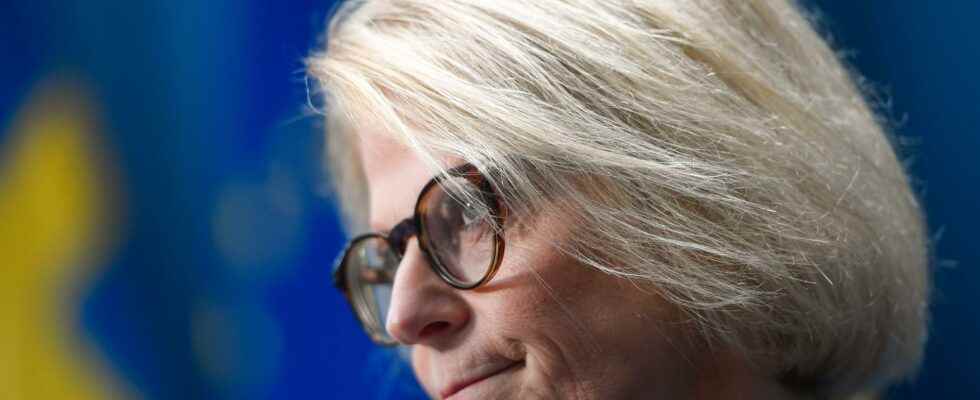Published: Just now
The government has promised to support households through difficult economic times.
But the high inflation causes problems and election promises hang loose. “Reality haunts” when the first budget is presented.
For example, there will be no reduction in the tax on investment savings account (ISK) savings, according to TT’s experience.
Finance Minister Elisabeth Svantesson (M) will on Tuesday present her and the governing parties’ Moderates, Christian Democrats, Liberals and the cooperation party Sweden Democrats’ first budget. She has spoken of it as “somewhat astringent”.
– It is important to be restrained in a very tough situation so as not to blow up inflation, says Svantesson to TT.
She describes what she brings as “a well-balanced budget in a difficult time”.
– We will support both households and businesses, but also focus on the major societal problems.
Reduced tax?
TT: Will there be any tax cuts in addition to the fuel tax?
– We will return to that in the budget.
Svantesson has had a tough job. Many election promises must be delivered, but also financed.
The merciless market reactions to the outgoing British Chancellor of the Exchequer’s first and only mini-budget sent shockwaves through the world’s finance departments. The assessors wondered how the big tax cuts would be paid for.
In Sweden, Riksbank governor Stefan Ingves has warned the government against doing something that repeats that mistake. Shooting oneself in the foot is not good, according to Ingves.
If investments and proposals drive inflation further, it affects households and businesses in the form of higher prices and interest rates.
Gloomy municipalities
Municipalities and regions have a gloomy view of the coming years.
At least 20 billion is needed in increased government subsidies, according to Sweden’s municipalities and regions (SKR). They are needed to keep pace with increased prices, wages, interest and inflation and to avoid sharp cuts.
– Of course we need to prioritize welfare, justice and defence. Those are the important parts of the budget, says Svantesson, who does not want to say anything about state subsidies.
Some of the most expensive proposals announced so far are intended to support households and businesses.
It is about the higher compensation levels in the unemployment insurance fund that were introduced during the pandemic remaining. It costs almost 6 billion.
Another is that the government is proposing a reduced tax on petrol and diesel by SEK 6.7 billion and yet another is an increased travel deduction for work trips by SEK 1.6 billion.
The defense receives increased funding of 5 billion, an addition that has been decided before. It will mainly pay for equipment and more employees.
So far, the government has announced proposals that take approximately 27 billion of the roughly 37 billion that Svantesson can play with. Around 7.5 billion of the space is created by the fact that the aid is not counted and that the reception of quota refugees is reduced from 5,000 to 900.
Far from promises
The reduced tax on fuel in 2023 is a long way from what several of the right-wing parties talked about in the election campaign, even seen as a first step. The Sweden Democrats promised to lower the price of diesel at the pump by 10 kroner per liter and over 6 kroner lower petrol prices. And the Christian Democrats said 9 and 5 kroner respectively lower.
The tax cut proposed so far only results in a 14 öre lower petrol price and a 41 öre lower diesel price at the pump. The rest of the promised tax cut of one kroner is eaten up by the tax rate being written up with inflation.
Reality haunts
“Sometimes reality is a ghost,” said SD’s economic policy spokesperson Oscar Sjöstedt to Dagens Nyheter the other day about promises versus outcomes. The reduction in the reduction obligation, which should contribute to lower prices, has been postponed until 2024.
There is pressure for the government to do more to help households against high electricity bills in the future.
Svenska kraftnät must indeed repay 55 billion kroner to households and companies in southern Sweden for last year’s high electricity prices in December or the beginning of 2023. But several heavy Scania moderates have pointed out that it is not the high-cost protection against winter electricity bills that was promised.
Has promised
There may be more proposals that affect household finances that have not yet been presented. The governing parties and SD have promised reduced taxes on income and pensions in the coming years.
Svantesson has not ruled out tax cuts for 2023.
But the state should not only be able to afford the tax cuts. These should not fuel inflation either.
In addition to reduced income taxes, the government aims to lower the tax on savings in so-called ISK accounts during the mandate period.
But there will be no sharp proposal about it now, TT learns.
Facts
Announced proposals in the 2023 budget
Reduced tax on petrol/diesel/fuel oil: SEK 6.8 billion
Maintained level in the unemployment insurance fund: 5.8 billion
Increased defense appropriations: 5 mdr
Increased mileage allowance, maintained travel deduction: 1.6 billion
The judiciary: 1.43 billion
Care and social care: 2.1 billion
School: 1.6 months
Industrial life: 0.6 billion
Climate step: 0.4 mdr
Extended reduced diesel tax for work machines: 0.38 billion
Increased tax reduction for the installation of solar cells: 0.28 billion
Housing allowance, supplement: 0.52 billion
Sickness benefit level (due to care queues): 0.21 mdr
ESS, research facility: 0.36 billion
————————————————- ——————
Total amount of proposals announced so far: approx. 27 billion
Read more
